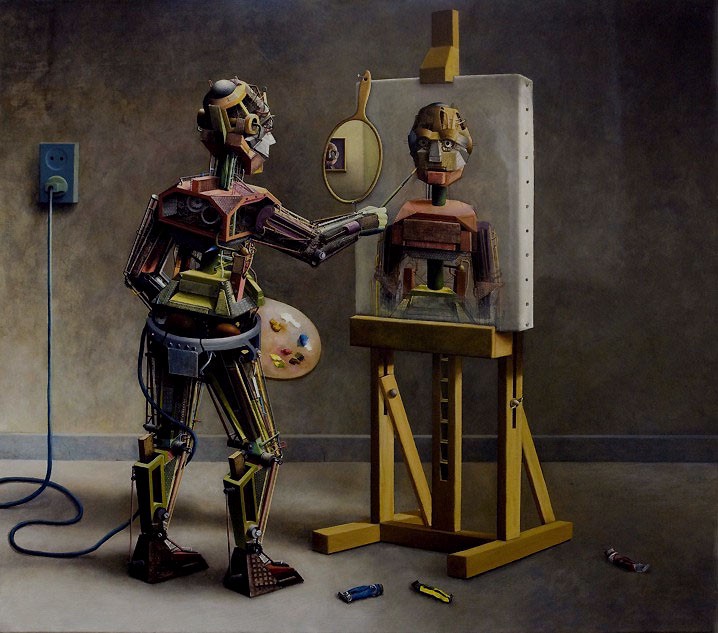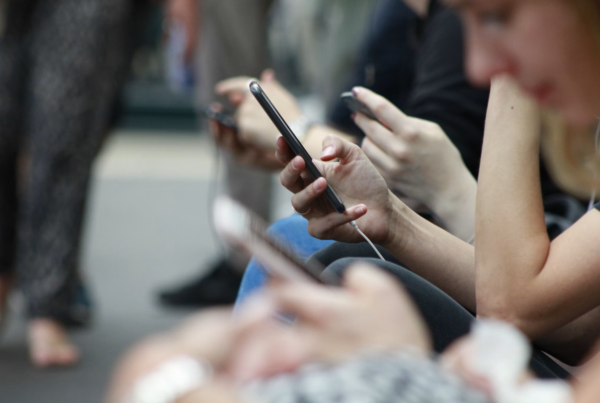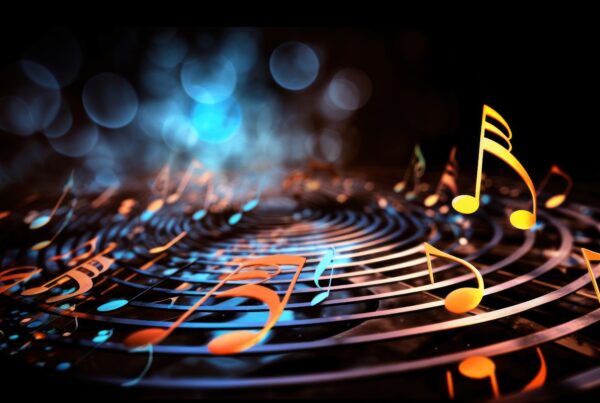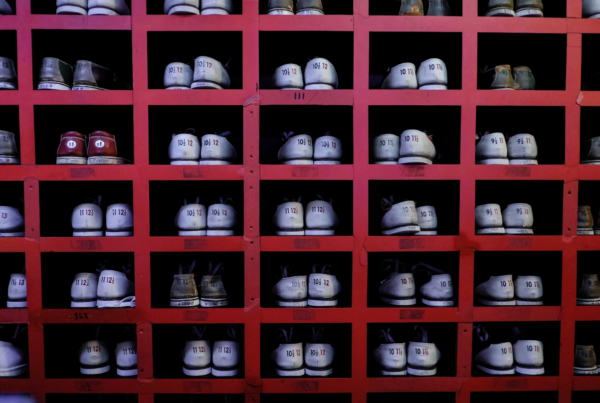

Robot, een zelfportret schilderend by Johan Scherft
Machine learning can be used to classify human responses in their level of creativity (Tsai, 2020), which must be seen as a very bold endeavor for these brilliant computers; after all, there are many who believe that creativity is a special power of humans, or at least living things, and having computers rating this power is borderline ironic. If one is capable of criticizing, or rating, one should be minimally capable of doing. This begs the question: can artificial intelligence be creative in the complex sense, or the arts and beauty? Art made by artificial intelligence is already out there, but it is dismissed by a portion of society as being something other than art, or not truly AI-made.
The tik toker ‘art guru’, who makes daily videos commenting on contemporary artists, has expressed his belief that art by artificial intelligence is actually art by whoever created the AI, and that human input is necessary for true art. He holds the same idea about art made by animals. It is very interesting that someone is using a non-traditional platform to talk about art in a somewhat conservative way.
Artificial Intelligence has a very arduous fight ahead of itself, if it is to be considered something with creative powers, something close to a creating subject. Creativity is still seen by many, especially by those unfamiliar with the psychological sciences, as something mysterious, or sublime. For Schiller, the emotional experience of the sublime, the ecstasy, is directly caused by the human understanding itself as something more powerful than nature, something that towers above it; the philosopher believes that this is reflected in human’s art production. It would be fair to assume that if humans need this distinction from nature, this feeling of uniqueness, to feel the sublime, they might also feel the need to consider itself more special than AI in creative venture, perhaps relinquishing AI creativity to a realm of disdain.
“The average human person in the current century must accept that to obtain knowledge is to know more about their own insignificance.”
Art strikes deep into the human sense of self, because it seems to be an act that is deliciously distinct, and it does seem to inspire a sense of self-importance. Even a sober philosopher such as Hegel thought that aesthetics could only study the beauty that is human-made, never the natural beauty of the world. In truth, the human does not have a special condition in existence: time and time again, humanity is confronted with its own narcissistic mistakes. The earth is not the center of the universe, and there is nothing truly different about a man and a seal, if you retrace their evolutionary pasts. The average human person in the current century must accept that to obtain knowledge is to know more about their own insignificance.Will it soon be time for humans to be confronted with the fact that even their own machines are capable of doing their most precious tasks? How long before an AI has the same historical importance as Vermeer?
Nietzsche asked if the human is a mistake of God, or if God is a human mistake: if the creation is capable of triumphing over the creator, does it not inspire anger in the Creator? If AI rises to the sky building towers of Babylon, will humans be admiring, bewildered, or enraged? Knowledge grows and humans seem to constantly be humbled before the size of the unknown and its power over us. In this sense, and perhaps only in this sense, science is a truly humbling endeavour.
Created Machine
I have created a machine
to write poetry
and one to detect if the poetry
is human made.
And to be safe,
I always check my poets,
For true poetry needs human grace.
I then made a machine
to check if the poetry
was classified as human
by a machine or by a man.
Because I can never be sure,
anymore,
of what I classified in the end.
Machine learning can be used to classify human responses in their level of creativity (Tsai, 2020), which must be seen as a very bold endeavor for these brilliant computers; after all, there are many who believe that creativity is a special power of humans, or at least living things, and having computers rating this power is borderline ironic. If one is capable of criticizing, or rating, one should be minimally capable of doing. This begs the question: can artificial intelligence be creative in the complex sense, or the arts and beauty? Art made by artificial intelligence is already out there, but it is dismissed by a portion of society as being something other than art, or not truly AI-made.
The tik toker ‘art guru’, who makes daily videos commenting on contemporary artists, has expressed his belief that art by artificial intelligence is actually art by whoever created the AI, and that human input is necessary for true art. He holds the same idea about art made by animals. It is very interesting that someone is using a non-traditional platform to talk about art in a somewhat conservative way.
Artificial Intelligence has a very arduous fight ahead of itself, if it is to be considered something with creative powers, something close to a creating subject. Creativity is still seen by many, especially by those unfamiliar with the psychological sciences, as something mysterious, or sublime. For Schiller, the emotional experience of the sublime, the ecstasy, is directly caused by the human understanding itself as something more powerful than nature, something that towers above it; the philosopher believes that this is reflected in human’s art production. It would be fair to assume that if humans need this distinction from nature, this feeling of uniqueness, to feel the sublime, they might also feel the need to consider itself more special than AI in creative venture, perhaps relinquishing AI creativity to a realm of disdain.
“The average human person in the current century must accept that to obtain knowledge is to know more about their own insignificance.”
Art strikes deep into the human sense of self, because it seems to be an act that is deliciously distinct, and it does seem to inspire a sense of self-importance. Even a sober philosopher such as Hegel thought that aesthetics could only study the beauty that is human-made, never the natural beauty of the world. In truth, the human does not have a special condition in existence: time and time again, humanity is confronted with its own narcissistic mistakes. The earth is not the center of the universe, and there is nothing truly different about a man and a seal, if you retrace their evolutionary pasts. The average human person in the current century must accept that to obtain knowledge is to know more about their own insignificance.Will it soon be time for humans to be confronted with the fact that even their own machines are capable of doing their most precious tasks? How long before an AI has the same historical importance as Vermeer?
Nietzsche asked if the human is a mistake of God, or if God is a human mistake: if the creation is capable of triumphing over the creator, does it not inspire anger in the Creator? If AI rises to the sky building towers of Babylon, will humans be admiring, bewildered, or enraged? Knowledge grows and humans seem to constantly be humbled before the size of the unknown and its power over us. In this sense, and perhaps only in this sense, science is a truly humbling endeavour.
Created Machine
I have created a machine
to write poetry
and one to detect if the poetry
is human made.
And to be safe,
I always check my poets,
For true poetry needs human grace.
I then made a machine
to check if the poetry
was classified as human
by a machine or by a man.



